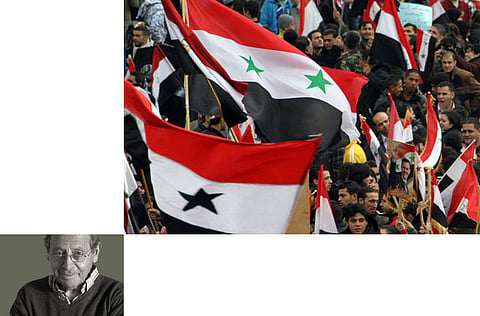Civil war in Syria must be averted
The country urgently needs the intervention of a high-powered, neutral, contact group to stop the killing on both sides

Syria is heading for a bloody sectarian civil war. The mutual kidnappings, torture, beheadings and displacement of populations taking place between the Sunni and Alawite communities in the central city of Homs — often described as ‘the capital of the revolution' — send a fearsome signal of what might be in store for the rest of the country.
To avert this descent into hell must surely be the immediate priority of Arab leaders and the international community. The Iraqi example next door is there for all to see. The Anglo-American invasion destroyed a major Arab country. The country's institutions and infrastructure were shattered; sectarian demons were released, triggering a civil war. More than a 100,000 died and millions were displaced from their homes or forced to flee abroad. The country was dismembered as the Kurds established their own semi-independent statelet.
Syria needs the intervention of a high-powered, neutral, contact group to stop the killing on both sides. There must be a pause in which tempers are cooled, demonstrations and counter-demonstrations are halted, and a climate created in which a real dialogue can take place and real reforms agreed and implemented. The aim must be a peaceful transition to a different sort of regime, with effective guarantees for all sides.
The Arab states and the western powers are ill-suited for this task. The latter are not trusted. Too many of them have taken sides. The US, in particular, has been discredited by its blind support for Israel. Rather than bringing peace, Washington's spectacular failure to resolve the Arab-Israeli conflict, or indeed its own 32-year conflict with Iran, has prepared the ground for future wars.
Who then could form the necessary contact group? My choice would be the Brics: Brazil, Russia, India and China — countries with real economic and political clout and a strong interest in the region.
Hama uprising
The present Syrian regime has been one of the most durable in the Middle East, lasting for almost half a century ever since the Baath party seized power in 1963. The Al Assads — father and son — have ruled since 1970. However, the current crisis poses a particular danger to the regime because, almost for the first time, it faces a conjunction of internal and external challenges.
The last big internal challenge occurred in 1977-1982, when an uprising by the Muslim Brotherhood threatened to topple the regime. The uprising was crushed at Hama with the loss of perhaps 10,000 lives — a brutal repression which continues to resonate to this day, as Islamists dream of revenge.
When Rafik Hariri, the former Lebanese prime minister, was assassinated in 2005, Syrian troops were forced out of Lebanon and the Syrian regime threatened with overthrow by US President George W. Bush and French President Jacques Chirac. In 2006 Israel attacked Lebanon to destroy Syria's ally, Hezbollah; it then attacked Gaza in 2008-9 to destroy another Syrian ally, Hamas.
The Syrian regime's instinct has been to interpret the current uprising as one more conspiracy. Taken by surprise, its immediate response was brutal repression: the use of live fire from the very beginning at Daraa in mid-March. No doubt, Al Assad had imagined that his nationalist stance gave him immunity from popular uprisings. But, faced by the escalating crisis, his leadership has been wanting; his speeches and promises of reform were late and unconvincing. His failure to seize the initiative with radical proposals showed a lack of political imagination. The killings have fatally undermined his legitimacy.
Who are the revolutionaries and what do they want? They are the rural poor, who have suffered from drought and government neglect; the urban poor and small businessmen, crushed by corrupt, crony capitalists close to the centre of power; and the armies of unemployed youth. Although isolated, sanctioned and internationally condemned, the regime still has several assets. So long as the army and security services remain loyal, it will be difficult for the opposition to topple it. The more the opposition takes to arms, the more the regime will feel justified in crushing it. Meanwhile, there is no appetite in the West for military intervention in Syria. Russia and China will protect it from any UN Security Council resolution authorising the use of force. The opposition remains divided, while the regime still enjoys the support of a large slice of the middle and upper classes in the big cities, of minorities such as Alawites, Christians and Druze, of large numbers of civil servants, and also no doubt of a silent majority, fearful of suffering the dreadful fate of Iraq.
As the death toll rises, the thirst for revenge becomes sharper and the sectarian divide deeper. Civil war looms and, with it, the urgent need for measures to avert it.
Patrick Seale is a commentator and author of several books on Middle East affairs, Asad of Syria: The Struggle for the Middle East and Abu Nidal: A Gun for Hire.



